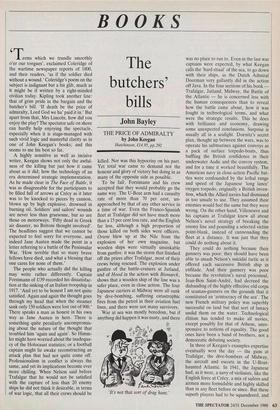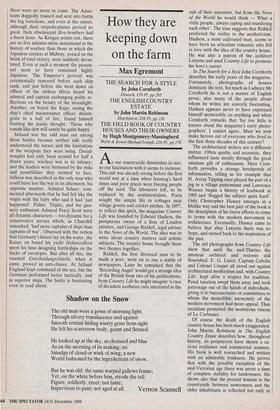BOOKS
The butchers' bills
John Bayley
THE PRICE OF ADMIRALTY by John Keegan
Hutchinson, £14.95, pp.292
Terms which we trundle smoothly o'er our tongues', exclaimed Coleridge of the wartime newspaper reports of 1800, and their readers, 'as if the soldier died without a wound.' Coleridge's poem on the subject is indignant but a bit glib, much as it might be if written by a right-minded civilian today. Kipling took another line: that of grim pride in the bargain and the butcher's bill. 'If death be the price of admiralty, Lord God we ha' paid it in.' But apart from that, Mrs Lincoln, how did you enjoy the play? The spectator safe on shore can hardly help enjoying the spectacle, especially when it is stage-managed with such vivid logic and masterful clarity as in one of John Keegan's books; and this seems to me his best so far.
A highly sensitive as well as incisive writer, Keegan shows not only the awful- ness of the killing but just how it came about as it did; how the technology of an era determined strategic implementation. As he made clear in The Face of Battle, it was as disagreeable for the participants to be filled full of arrows at Crecy as it later was to be knocked to pieces by cannon, blown up by high explosive, drowned in burning oil. Soldiers' and sailors' wounds are never less than gruesome, but so are those on motorways. 'Fifty dead in Greek air disaster, no Britons thought involved'. The headlines suggest that we cannot be expected to feel sorry for everyone, and indeed Jane Austen made the point in a letter referring to a battle of the Peninsular War. 'How terrible that so many brave fellows have died, and what a blessing that one cares for none of them.'
The people who actually did the killing may write rather differently. Captain Forstmann of U39 recorded his dissatisfac- tion at the sinking of an Italian troopship in 1917. 'And yet to be honest I am -not quite satisfied. Again and again the thought goes through my head that when the steamer sank only 150 soldiers were lost out of 900.' There speaks a man as honest in his own way as Jane Austen in hers. There is something quite peculiarly uncompromis- ing about the nature of the thought that troubled him 'again and again'. So Himm- ler might have worried about the inadequa- cy of the Holocaust statistics; or a football captain might lie awake reconstructing an attack plan that had not quite come off. Professionalism in conflict is always the same, and yet its implications become ever more chilling. When Nelson said before Trafalgar that he would not be satisfied with the capture of less than 20 enemy ships he did not think it desirable, in terms of war logic, that all their crews should be killed. Nor was this hypocrisy on his part. Yet total war came to demand not the honour and glory of victory but doing in as many of the opposite side as possible. To be faii, Forstmann and his crew accepted that they would probably go the same way. The U-Boat arm had a casualty rate of more than 70 per cent, un- approached by that of any other service in a time of war. Even the Franco-Spanish fleet at Trafalgar did not have much more than a 15 per cent loss rate, and the English far less, although a high proportion of those killed on both sides were officers. Orient blew up at the Nile from the explosion of her own magazine, but wooden ships were virtually unsinkable from gunfire: it was the storm that finished off the prizes after Trafalgar, most of their crews being rescued. The explosion under gunfire of the battle-cruisers at Jutland, and of Hood in the action with Bismarck, shows that a wooden ship of the line was a safer place, even in close action. The four Japanese carriers at Midway were all sunk by dive-bombing, suffering catastrophic fires from the petrol in their aviation fuel lines, and there were not many survivors.
War at sea was mostly boredom, but if anything did happen it was nasty, and there 'it's not that sort of drag hunt.' was no place to run to. Even in the last war captains were expected, by what Keegan calls the 'hard ritual' of the sea, to go down with their ships, as the Dutch Admiral Doorman very gallantly did in the action off Java. In the four sections of his book — Trafalgar, Jutland, Midway, the Battle of the Atlantic — he is concerned less with the human consequences than to reveal how the battle came about, how it was fought in technological terms, and what were the strategic results. This he does with brilliance and economy, drawing some unexpected conclusions. Surprise is usually all in a seafight. Doenitz's secret plan, thought up between the wars, was to operate his submarines against convoys as a pack of surface torpedo-boats, thus baffling the British confidence in their underwater Asdic and the convoy system, and for a time it worked beautifully. The American navy in close-action Pacific bat- tles were confounded by the lethal range and speed of the Japanese 'long lance' oxygen torpedo, originally a British inven- tion, which the Allied navies had dismissed as too unsafe to use. They assumed their enemies would feel the same but they were wrong. On the other hand, Villeneuve and his captains at Trafalgar knew all about Nelson's novel strategy of breaking the enemy line and pounding a selected victim point-blank, instead of cannonading the fleet at a distance. It was just that they could do nothing about it.
They could do nothing because their gunnery was poor: they should have been able to smash Nelson's suicidal tactic as it offered each successive British ship in enfilade. And their gunnery was poor because the revolution's naval proconsul, Jean-Bon Saint-Andre, had decreed the disbanding of the highly effective old corps of seaman-gunners on the grounds that it constituted an 'aristocracy of the sea'. The new French military policy was superbly successful on land but that sort of lunacy undid them on the water. Technological elitism has tended to make all navies, except possibly for that of Athens, unre- sponsive to notions of equality. The good ones have been a band of brothers, not a democratic debating society.
In three of Keegan's examples expertise eventually won the day — the guns at Trafalgar, the dive-bombers of Midway, the aircraft and escorts in the U-Boat- haunted Atlantic. In 1941, the Japanese had, as it were, a navy of violinists, like the English force at Crecy, a mix of sailors and airmen more formidable and highly skilled than in any fleet before or since. But these superb players had to be squandered, and there were no more to come. The Amer- icans doggedly trained and sent into battle the big battalions, and even at the outset, although their torpedo-planes proved no good, their obsolescent dive-bombers had a finest hour. As Keegan points out, there are no five minutes more sensational in the history of warfare than those in which the Japanese carriers at Midway, poised on the brink of total victory, were suddenly devas- tated. Even at such a moment the person- nel seem to have remained highly Japanese. The Emperor's portrait was ceremonially removed before each ship sank, and just before she went down an officer of the striken Hiryu heard his admiral and captain exchanging polite re- flections on the beauty of the moonlight. Another, on board the Kaga, seeing the ship's chief maintenance officer disinte- grate in a ball of fire, found himself framing the poetic thought: 'Those who vanish like dew will surely be quite happy.'
Jutland was the odd man out among these battles because neither side really understood the nature and the limitations of the weapons they were using. Dread- noughts had only been around for half a dozen years; wireless was in its infancy; and the leaders were bemused by the risks and possibilities they seemed to face. Jellicoe was described as the only man who could have lost the war in an afternoon: his opposite number, Admiral Scheer, com- mented afterwards that he had felt like the virgin with the baby who said it had 'just happened'. Fisher, Tirpitz, and the gun- nery enthusiast Admiral Percy Scott were all dynamic characters — too dynamic for a conservative service which, as Churchill remarked, 'had more captains of ships than captains of war'. Obsessed with the notion that Germany's future lay on the water, the Kaiser on board his yacht Hohenzollern spent his time designing battleships on the backs of envelopes. But after all this, the vaunted Entscheidungschlacht, when it came, proved an anti-climax. At Jutland England kept command of the sea, but the Germans performed better tactically, and in superior ships. The battle is frustrating even to read about.











































































































 Previous page
Previous page